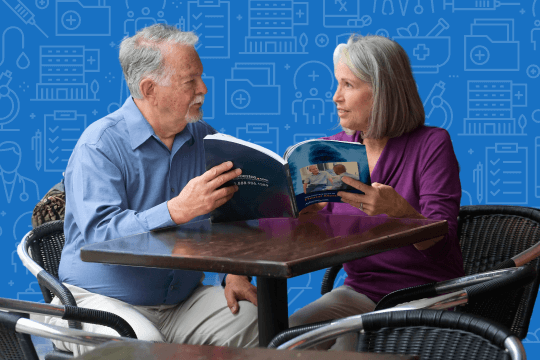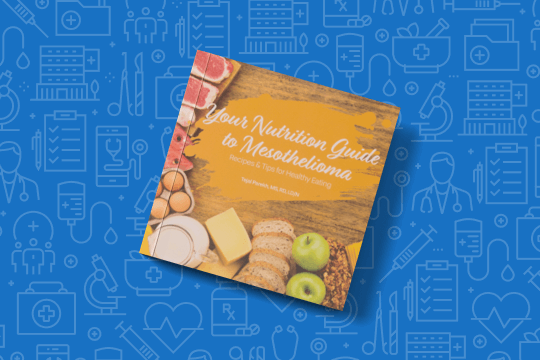
Get answers about treatment, top doctors, and clinical trials from the nation’s most trusted mesothelioma resource.
Get Your Free GuideWritten by Karen Selby | Edited by Amy Edel
A nutritious diet can help people with lung cancer feel better, manage side effects and recover faster from treatment. Maintaining a healthy weight and getting the right balance of vitamins, minerals and antioxidants can help your body stay strong, heal and keep up your energy.
People with lung cancer need a nutrition plan that gives them extra calories and protein. This helps them maintain a healthy weight. A study published in peer-reviewed journal Nutrients in April 2025 found lung cancer patients who start eating better early in treatment are less likely to have serious weight loss.
“To avoid weight loss, we want to make sure we’re getting not only enough calories but also enough protein,” Tejal Parekh, registered and licensed dietitian, tells us. “Proteins are the building blocks of our cells. They’re responsible for the body’s growth and repair. Getting a mix of calories from protein, fat and carbohydrates will help to keep you strong both mentally and physically.”
A lung cancer diet is a healthy eating plan that can help you feel better and stay strong before, during and after lung cancer treatment. Chemotherapy, radiation or surgery can make people feel tired and cause weight loss. A lung cancer diet can help boost energy with the nutrients your body needs.
It focuses on eating lean protein, fruits, vegetables and whole grains. It also limits red meat, processed foods and sugar. Eating small meals throughout the day can make it easier to get enough food without feeling too full.
Soft foods like yogurt, mashed potatoes or soup can also be easier to eat, especially if someone doesn’t feel well. Drinking lots of water also helps your body keep from getting dehydrated and heal. With the right foods and enough fluids, a lung cancer diet can help you feel stronger and support your recovery.

Get answers about treatment, top doctors, and clinical trials from the nation’s most trusted mesothelioma resource.
Get Your Free GuideSome of the best foods for lung cancer patients include healthy fats, lean proteins and complex carbs that give your body energy and help it fight illness. Avoiding fried and ultra-processed foods can help you maintain your overall health and ease lung disease symptoms.
Certain foods also directly support lung health. Fresh fruits and vegetables, whole grains and foods rich in antioxidants and anti-inflammatory nutrients can protect your lungs and improve breathing. For example, eating berries, leafy greens, beets and tomatoes can reduce swelling in the lungs and give your body the vitamins it needs to heal.
“If you have lung cancer, I recommend increasing your intake of produce because it’s vital to building a healthy body. Research indicates plant-based foods loaded with antioxidants and phytochemicals, such as fruits and vegetables, can help fight cancer.”
Protein keeps your body strong and helps you build immune cells that fight illness. Try to eat a good source of protein at least twice a day to support your lungs and help your body stay healthy, fight infections and heal faster.
Recommended Protein-Rich Foods
When you eat these foods regularly, they give your body the fuel it needs to feel better and stay as healthy as possible. Not only do these foods help build the body, but they can also repair tissues that may have been damaged during cancer treatments like chemo and radiation treatments.
Antioxidants are natural substances in healthy foods like fruits and vegetables. They include vitamins like C and E and plant compounds such as flavonoids (found in colorful fruits) and carotenoids (which give carrots and sweet potatoes their orange color). These help protect your cells from damage.
Recommended Fruits and Vegetables
The antioxidants in foods like leafy green vegetables, apples and pumpkins protect cells from harmful molecules called free radicals. Cancer treatments can create these free radicals, and too many of them can damage healthy cells. Eating antioxidant-rich foods can help the body stay strong during treatment.
Whole grains give people with lung cancer a steady source of energy throughout the day. Unlike simple sugars that can cause energy crashes, whole grains break down slowly in the body. This helps keep blood sugar levels balanced and reduces sudden drops in energy.
Recommended Whole Grains
Foods like whole wheat bread, brown rice, oats and quinoa can improve digestion and help the body use nutrients more effectively. Whole grains also provide fiber, vitamins and minerals that support overall health. Patients experiencing fatigue from cancer treatments may feel a difference in how they feel when adding whole grains into their diet.
People coping with lung cancer need to maintain a healthy weight. Unsaturated fats like monounsaturated and polyunsaturated fats are a helpful way to prevent weight loss. Unsaturated fats are healthy fats that usually stay liquid at room temperature. They’re found in olive oil, avocado oil, nuts and seeds.
They come from plants and don’t contain cholesterol. These healthy fats help lower blood pressure, reduce swelling in the body and support your overall health. When your body feels better and less inflamed, it can make breathing easier too.
Recommended Healthy Fats
Omega-3s found in fish and flaxseed can support the immune system and help the body respond better to treatment. Adding these fats to meals can help people with lung cancer feel stronger and more balanced while they recover.
Drinking enough fluids is very important for those coping with lung cancer. Staying hydrated supports healing and keeps organs working properly. When patients get treatments like chemo or radiation, they might lose fluids more easily or feel thirsty more often.
Recommended Fluids and Hydrating Foods
Staying hydrated can also help reduce side effects like dry mouth and increase energy levels. Hydrating foods also add moisture to the body.
Sipping water throughout the day can also help. You may find reusable bottles, setting reminders and flavoring water with fruit beneficial if you find it hard to sip water during the day.
People with asbestos-related cancer like lung cancer or mesothelioma should avoid foods that can worsen symptoms or make healing harder. Licensed dietitian Tejal Parekh tells us, “Specific foods to eat or avoid will really depend on your individual side effects. For example, if you’re experiencing a sore throat, I recommend avoiding spicy and acidic foods such as orange juice or hot sauces as these can further irritate your throat.”
Not knowing what or how much to eat during cancer treatment can make people feel stressed or overwhelmed. Lung cancer and mesothelioma patients can work with a dietitian to create a meal plan that fits their needs and helps them feel better during treatment.
A recently published meta-analyses review in BMJ found ultra-processed foods increase the risk of anxiety, cancer, diabetes, heart disease and high blood pressure. People with conditions like these may not qualify for all treatment options and may be at a higher risk for complications from chemo or surgery.
Recommended Processed Foods and Red Meats to Avoid
Ultra-processed foods usually contain a lot of sugar, fat and salt but not much fiber or nutrients. Cured meats and cold cuts also have nitrates in them. Companies add nitrates to make the meat look better and last longer. But nitrates can harm the lungs. Choosing lean meats like salmon or chicken are a healthier option if you’d like to eat meat.
Fried foods like french fries, onion rings and fried chicken can lead to bloating, pushing on the lungs and making breathing more difficult for people with lung cancer. Greasy foods can also upset the stomach and cause acid reflux, which may lead to chest discomfort.
Fried and greasy foods also contain unhealthy fats, which can raise cholesterol, increasing the risk of a heart attack and stroke. Meals that are baked, steamed or grilled can help you feel full and maintain healthy nutrition.
The processed and excess sugar in sodas and some snacks can cause inflammation. This inflammation can worsen lung cancer symptoms and interfere with healing. Too much sugar can also cause high blood pressure, which can limit treatment options or cause complications.
Carbonated sodas can cause gas and bloating, which can put pressure on the lungs and make breathing harder. Many sodas also have caffeine, which can raise your heart rate and affect how some medicines work. Flavored water, tea and natural juices are healthier choices for staying hydrated.

Access expert diet and exercise guidance designed specifically for mesothelioma patients to support treatment and overall wellness.
Get Your Free GuideMany lung cancer patients find eating challenging during treatment. Side effects like nausea, mouth sores or changes in taste can make meals less enjoyable. You may feel too tired or lose your appetite. But even when eating is difficult, your body still needs energy and nutrients to stay strong and heal.
Making a few changes can help you get the nutrition you need. Eating smaller meals more often, drinking plenty of fluids and choosing soft or easy-to-digest foods can make a big difference. It also helps to talk to a licensed dietitian who specializes in helping people with cancer. Your doctor may be able to recommend a dietitian who can help you.
Appetite loss is common for people going through lung cancer treatment. You may not feel hungry or may feel full after only a few bites. This can make it hard to get enough nutrients. Eating small snacks throughout the day, even when not hungry, can help provide energy.
Nausea can also make it difficult to eat. Treatments like chemo often upset the stomach. Strong smells, certain foods or even stress can make nausea worse. You can try eating bland foods like crackers, toast or plain rice to calm your stomach. Sipping clear fluids and resting after meals may also help.
Some lung cancer treatments can cause mouth sores or make swallowing difficult. These problems can make eating painful or uncomfortable. You may not feel like eating as much, which can lead to weight loss or weakness. Choosing soft foods and avoiding spicy, crunchy or acidic foods can help.
Drinking plenty of water during the day can keep your mouth moist and ease swallowing. Using a straw may also make it easier to drink if your mouth feels sore. Lukewarm or cool foods can be more soothing than hot foods.
You may feel very tired during your lung cancer treatment. The cancer itself, treatment side effects, poor sleep or not eating enough can all contribute to fatigue.
This tiredness can make everyday activities feel hard. Rest doesn’t always fix the problem, so finding ways to manage it matters. Eating healthy foods and drinking enough water can help increase energy.
A one-day meal plan should include simple, easy-to-digest foods that give your body important nutrients. It can help you feel stronger and support recovery during your lung cancer treatment.
Sample Meal Plan
Everyone has different needs. Talk with your dietitian or healthcare team to make sure your meal plan works with your food preferences, treatment side effects and other health conditions.
It’s never too soon after receiving your lung cancer diagnosis to talk to a registered dietitian. Meeting with a dietitian before treatment begins can help you get ready for changes that might affect your appetite, digestion or energy. Eating well early on helps build up strength and important nutrients the body needs during treatment.
A dietitian specializing in cancer can create a personalized meal plan for you to help manage side effects from treatment. If you start having trouble eating or begin to lose weight, reach out to your dietitian for extra support.
Stay up-to-date on treatment, research, clinical trials, doctors and survivors
The information on this website is proprietary and protected. It is not a substitute for professional medical advice, diagnosis or treatment. Any unauthorized or illegal use, copying or dissemination will be prosecuted. Please read our privacy policy and terms of service for more information about our website.
This website and its content may be deemed attorney advertising. Prior results do not predict a similar outcome.
The Mesothelioma Center’s claim as the most trusted resource is based on our more than 150 5-star Google and BBB reviews. Our organization also helps more than half of all mesothelioma patients annually diagnosed.
Your web browser is no longer supported by Microsoft. Update your browser for more security, speed and compatibility.
If you are looking for mesothelioma support, please contact our Patient Advocates at (855) 404-4592
The Mesothelioma Center at Asbestos.com has provided patients and their loved ones the most updated and reliable information on mesothelioma and asbestos exposure since 2006.
Our team of Patient Advocates includes a medical doctor, a registered nurse, health services administrators, veterans, VA-accredited Claims Agents, an oncology patient navigator and hospice care expert. Their combined expertise means we help any mesothelioma patient or loved one through every step of their cancer journey.
More than 30 contributors, including mesothelioma doctors, survivors, health care professionals and other experts, have peer-reviewed our website and written unique research-driven articles to ensure you get the highest-quality medical and health information.
My family has only the highest compliment for the assistance and support that we received from The Mesothelioma Center. This is a staff of compassionate and knowledgeable individuals who respect what your family is experiencing and who go the extra mile to make an unfortunate diagnosis less stressful. Information and assistance were provided by The Mesothelioma Center at no cost to our family.LashawnMesothelioma patient’s daughter


Selby, K. (2026, February 9). Best Diet for Lung Cancer Patients: Foods to Eat and Avoid. Asbestos.com. Retrieved February 13, 2026, from https://www.asbestos.com/treatment/nutrition/lung-healthy-foods/
Selby, Karen. "Best Diet for Lung Cancer Patients: Foods to Eat and Avoid." Asbestos.com, 9 Feb 2026, https://www.asbestos.com/treatment/nutrition/lung-healthy-foods/.
Selby, Karen. "Best Diet for Lung Cancer Patients: Foods to Eat and Avoid." Asbestos.com. Last modified February 9, 2026. https://www.asbestos.com/treatment/nutrition/lung-healthy-foods/.

Karen Selby is a registered nurse and Board Certified Patient Advocate at The Mesothelioma Center with more than 30 years of experience in oncology and thoracic surgery. She worked as an operating room nurse in thoracic surgery at the University of Maryland for 6 years, assisting with surgeries such as lung transplants, pneumonectomies and pleurectomies. She later served as regional director of the tissue procurement program at the University of Florida. Karen joined The Mesothelioma Center in 2009, providing patients with personalized support and resources.
Our fact-checking process begins with a thorough review of all sources to ensure they are high quality. Then we cross-check the facts with original medical or scientific reports published by those sources, or we validate the facts with reputable news organizations, medical and scientific experts and other health experts. Each page includes all sources for full transparency.
Please read our editorial guidelines to learn more about our content creation and review process.
